|
|
|
Sort Order |
|
|
|
Items / Page
|
|
|
|
|
|
|
| Srl | Item |
| 1 |
ID:
129967
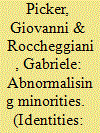

|
|
|
|
|
| Publication |
2014.
|
| Summary/Abstract |
This article expands the research on abnormalisation and the construction of social deviance of minorities. It focuses on the relationships between state practices, policies and expert knowledge addressing the Roma in Italy; it does so by first contextualising recent ethnographic findings on Turin authorities' social inclusion practices addressing Roma within the history of national and regional policies for Roma; it then contextualises those policies within the history of expert knowledge about Roma. Unlike what other studies on abnormalisation suggest, we argue that the abnormalisation of Roma in Italy is not primarily predicated upon the idea that they are at present unfit to follow the norms of the majority; rather, it stays upon a historically rooted representation of Roma oscillating between the poles of potential re-educability and potential dangerousness. In the conclusion we encourage further comparative research on abnormalisation, especially including practices and knowledge addressing other European minorities such as the Jews.
|
|
|
|
|
|
|
|
|
|
|
|
|
|
|
|
| 2 |
ID:
129978
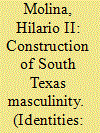

|
|
|
|
|
| Publication |
2014.
|
| Summary/Abstract |
I contend that masculinity formation in South Texas is linked to objects that have been deemed as 'manly'. This study is significant because it examines a group in the US population that, according to census predictions, account for a large percentage of the fastest growing and largest Latino group in the United States. This autoethnography research examines how pico de gallo - a type of salsa - and the barbeque grill assist working-class Mexican American males in constructing a masculine identity known as macho. The data are based on observing 30 social events in the Rio Grande Valley. The findings reveal a pursuit for an apex status of macho through these objects and the cultural transmission of gender roles to the next generation of males. This study concludes by offering suggestions in examining how masculinity, for men of colour, might be linked to marginalisation practices within a social structure.
|
|
|
|
|
|
|
|
|
|
|
|
|
|
|
|
| 3 |
ID:
128135
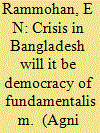

|
|
|
|
|
| Publication |
2013.
|
| Summary/Abstract |
Bangladesh was born in December 1971, after Pakistan rejected installation of the Awami League of East Pakistan, that had won the national elections held in end 1970 and then proceeded to crush democracy in East Pakistan by arresting the leaders of the Awami League and brutally suppressing its democratic movement. The Awami League and the people of East Pakistan were thus forced to resort to guerilla warfare and fight for independence. In this fight the Muslim population of East Pakistan got divided. Some Bengali Muslims who supported the fundamentalist right, sided with Pakistan in its attempt to crush the move for independence by the majority of Bengali Muslims.
|
|
|
|
|
|
|
|
|
|
|
|
|
|
|
|
| 4 |
ID:
129273
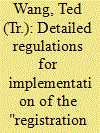

|
|
|
|
|
| Publication |
2012.
|
| Summary/Abstract |
The article offers information regarding the Chinese regulations on Chinese Muslims traveling abroad on Hajj pilgrimages. It mentions that the applicants for Hajj pilgrimages should comply with the conditions including the Chinese citizen should be greater than 18 years of age and believe in Islam religion, the citizen should be physically healthy, and should possess funds adequate for the pilgrimage.
|
|
|
|
|
|
|
|
|
|
|
|
|
|
|
|
| 5 |
ID:
129274
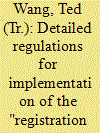

|
|
|
|
|
| Publication |
2012.
|
| Summary/Abstract |
The article offers information regarding the Chinese regulations on Chinese Muslims traveling abroad on Hajj pilgrimages. It mentions that the applicants for Hajj pilgrimages should comply with the conditions including the Chinese citizen should be greater than 18 years of age and believe in Islam religion, the citizen should be physically healthy, and should possess funds adequate for the pilgrimage.
|
|
|
|
|
|
|
|
|
|
|
|
|
|
|
|
| 6 |
ID:
127323
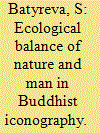

|
|
|
| 7 |
ID:
130575
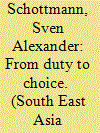

|
|
|
|
|
| Publication |
2014.
|
| Summary/Abstract |
A content analysis of print advertisements and customer websites of Islamic banks in Malaysia, this paper examines the changing marketing and branding landscape of Islamic banking products and financial services. When Islamic banks were first set up in Malaysia in the early 1980s, their advertising material emphasized the religious obligations of Muslims to save and invest with shari'a-compliant financial products and services. Amid the ongoing liberalization of Malaysia's Islamic banking sector since the mid-1990s, a transformation of this marketing strategy appears to have taken place. Islamic banks no longer emphasize a priori the religious imperatives or even the ethical principles that underlie their business model. Rather, they tend to stress that banking according to the principles of the shari'a is an economically rational alternative to the conventional system. Islamic banks in Malaysia portray themselves not simply as Islamic banks, but as better, more profitable and safer alternatives to the crisis-prone conventional, interest-based banking sector. This paper examines this transformation, and seeks to relate the three broad trends it has identified in the advertisement of Islamic banking services to the wider socio-cultural, economic and political changes that have been under way in Malaysia since the late 1960s.
|
|
|
|
|
|
|
|
|
|
|
|
|
|
|
|
| 8 |
ID:
128141
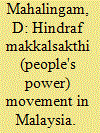

|
|
|
|
|
| Publication |
2014.
|
| Summary/Abstract |
HINDRAF, the Hindu rights advocacy group spearheaded and organized the Indian spring on November 24, 2007 on the eve of golden jubilee year of Malaysia's independence and confronted the Malaysian state in a bid to highlight the predicament of the Indian ethnic minority. The political mobilization was popularly known as HINDRAF Makalsakthi movement as a huge numbers of Indian belonging to different strata overwhelmingly participated - even thought there was threat and intimidation from the ruling establishments against participation to vent out their anger.
|
|
|
|
|
|
|
|
|
|
|
|
|
|
|
|
| 9 |
ID:
130576
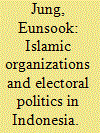

|
|
|
|
|
| Publication |
2014.
|
| Summary/Abstract |
What role do Muslim social and educational organizations play in Indonesian politics after democratization? When democratization opens up a larger political space for Islamic organizations to participate in politics, do Muslim organizations emerge as political powers or remain socio-religious organizations? How do Muslim organizations engage in electoral politics? This article addresses these questions by examining the role of Muhammadiyah in democratic Indonesian politics. The author argues that Muhammadiyah's political behaviour is driven by its institutional logic, which places its religious and social duties before its political interests. Although there have been attempts by some elites to take advantage of Muhammadiyah for their own political gains, Muhammadiyah has managed to refrain from building or supporting a particular political party at the organizational level. Moreover, political learning through unsuccessful outcomes in initial elections and bitter experience with PKS also alerted Muhammadiyah to the need to protect itself from partisan politics by emphasizing its organizational principle. This article also demonstrates how religious institutions use politics for religious ends and to confirm the integrity of their community.
|
|
|
|
|
|
|
|
|
|
|
|
|
|
|
|
| 10 |
ID:
128510
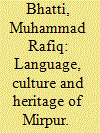

|
|
|
|
|
| Publication |
2013.
|
| Summary/Abstract |
Language, culture and heritage are the cornerstones of civilizations - ancient, medieval and present. It is very difficult to draw the lines of demarcation between languages, cultures and heritage of different regions
because these are interwoven and overlapping. Language is a medium of -expression of feelings, emotions, reason, prudence, passions and vision. Mankind since time irnmemorial has evolved different modes of expression, écalled tongues, dialects or languages. A language is a living organism, 'which originates, develops and dies. There are so many languages that have died away and are extinct now. l Culture re?ects the macro and micro behavioural structure of a society :generally accepted. All practices that people undertake, adopt or follow {consciously for their economic, social, political, moral, religious or spiritual
satisfaction come under the garb of culture. These practices, rites, rituals, =;customs, traditions, arts, architecture, food and dress etc. become part of . their individual and collective life and pass on from generation to -generation. It is a process of history and differentiates one community from other, one nation from other and one time span from the other. It is e a tree that has its roots in the past, branches in the present and shades future.
|
|
|
|
|
|
|
|
|
|
|
|
|
|
|
|
| 11 |
ID:
131855
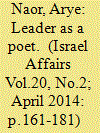

|
|
|
|
|
| Publication |
2014.
|
| Summary/Abstract |
This article analyses Ze'ev Jabotinsky's Zionist ideology as expressed in his political poetry. It includes inter alia lessons from the pogroms, the need for emergence of 'a new Jew' who would show by his conduct that he is 'a son of kings', who is ready to either die or capture the mountain, believing in the Jewish national right over the Land of Israel on both banks of the Jordan, as well as in the rights of its Arab and Christian inhabitants. These and other ideological principles appear in his poetry alongside a war of words with the Zionist left.
|
|
|
|
|
|
|
|
|
|
|
|
|
|
|
|
| 12 |
ID:
129965
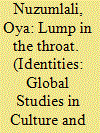

|
|
|
|
|
| Publication |
2014.
|
| Summary/Abstract |
The unprecedented election of a Süryani-Keldani, a member of a minority Christian community, to the parliament of Turkey, elicited responses from the community that embodied conflicting dispositions as to what a Süryani-Keldani identity entails. This article defines intimate communities and elaborates on the concept of model minority as it pertains to this particular group, and in doing so, offers a criticism of multiculturalism's tendency to essentialise ethnic groups through affect theories.
|
|
|
|
|
|
|
|
|
|
|
|
|
|
|
|
| 13 |
ID:
128488
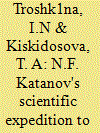

|
|
|
|
|
| Publication |
2013.
|
| Summary/Abstract |
Actual position of the investigation of this territory was expressed in academician V. V. Radloff's words: "Importance of the investigation of the Turkic tribes' remains in the far east is unquestionable because these
countries have never been visited by experts of the Turkic languages. And we have only odd bits of information collected by outside observers who were not specially prepared for aimobjective".' In 1891 N. F. Katanov was sent by Imperial Saint-Petersburg Academy of Science and Imperial Russian Geographic Society to Eastern Turkestan as the most prepared specialist in the Turkic languages. The investigation of the territory was held in the framework of an investigation project of the Turkic tribes in Eastern Siberia, Mongolia and Northern China to analyse the Turkic tribes' language and household activities. At that time Eastern Turkestan or Uigurstan was a part of China as its northern region - Xinjiang which included Kashgaria (southern part) and Dzungaria (northern part). Population of this region comprised of different Turkic groups: the Turcomen- Uygurs and Kazakhs-Kirghiz worshiping Islam, the Mongolians-Oirats and Chinese Turcomen worshiping Buddhism, etc.
|
|
|
|
|
|
|
|
|
|
|
|
|
|
|
|
| 14 |
ID:
165136
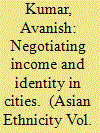

|
|
|
|
|
| Summary/Abstract |
Ethnic communities constantly fear of being stripped of their cultural identities, which intern their preference of shying away from settling in slums. The difficulty arises from the highly contingent conceptualization of ‘slum’, as an agglomerate of poor seeking income. The paper investigates paradox of identity embedded in insecurities among ethnic migrants who lack recognition by the state and society. Data was collected using observation, in-depth interviews, and focus group discussions. Constant comparative method (CCM) together with thematic sampling was used for data analysis. The finding suggests that alienation of ethnic migrants is a consequence of constant negotiation of their identity in response to ‘self-society-State’. It recommends slum to retain independent social space for ethnic community and society in a composite culture. To overcome the challenges of identity, income, and insecurity among ethnic migrants, the paper proposes a convergence model to integrate co-existence of multiple identities for public entitlements, welfare, and social acceptance.
|
|
|
|
|
|
|
|
|
|
|
|
|
|
|
|
| 15 |
ID:
128876
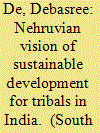

|
|
|
|
|
| Publication |
2014.
|
| Summary/Abstract |
As the first Prime Minister of India, Nehru pursued a policy of rapid industrialisation and national development, largely equated with economic growth and surplus. He once said that dams are the temples of modern India and claimed that big dams would address India's hunger and poverty. However, such development agenda also created much pain and suffering for the owners/users of land sacrificed in the public interest, mostly the indigenous people of India (Adivasis). This article critically analyses the impact of development policies on the Adivasi peoples of India, earlier and today. It argues specifically that Nehru's well-sounding development concept of Panchsheel, the 'Five Pillars of Tribal Development', did not work for the Adivasis and largely ruined their own efforts to secure sustainable development.
|
|
|
|
|
|
|
|
|
|
|
|
|
|
|
|
| 16 |
ID:
129961
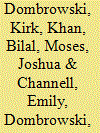

|
|
|
|
|
| Publication |
2014.
|
| Summary/Abstract |
This paper describes results from a network survey of Nain - a predominantly Inuit community of ~1200 people located on the northern coast of Labrador. As part of a larger social network research project, we used peer-referral sampling to recruit 330 residents for interviews about food sharing, housing, public health and community traditions. The peer-referral chains were analysed statistically to determine the presence and absence of social divisions in the community. The results of these analyses show that ethnic identification, relocation status and household income were the most significant social divisions in the community, while gender, education level and employment status show little or no effect on patterns of between-group interconnection. We argue that statistical patterns in the presence (and absence) of intergroup links offer novel ways to examine the interrelationship between recent economic development and the historical disruptions caused by Inuit community relocations in the 1950s.
|
|
|
|
|
|
|
|
|
|
|
|
|
|
|
|
| 17 |
ID:
128490
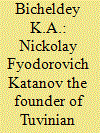

|
|
|
|
|
| Publication |
2013.
|
| Summary/Abstract |
Tuvinian studies is a comparatively new branch in Russian science and represents a set of scientific actions of collective and individual character. In a broader meaning it is a knowledge system about Tuva and the
Tuvinians. Its formation, further development and expansion are connected with the activity of Imperial Russian Geographic Society (IRGS) in the investigation and study of Central Asia in the second half of nineteenth and early twentieth century. The period from 1842 till 1945 can be conditionally called as "the
golden age" of Tuvinian studies. Undoubtedly it was preceded by a range of Tuvinian studies / researches in sixteenth to nineteenth centuries. In this period of history Russian empire strengthened the spread of its
geopolitical interests in Central Asia. Independent explorers and entire expeditions from Russia went to Mongolia, China and Tibet for different purposes including scientific ones. Frequently their pathway ran through the Uryankhai region (one of the former names of Tuva at that time), so explorers and researchers included Uryankhai (Tuva) in the plans of their investigations. Eventually general interest of the Russian empire and its scientific society in Central Asia led to the execution also of special investigations about Tuva.
|
|
|
|
|
|
|
|
|
|
|
|
|
|
|
|
| 18 |
ID:
134220
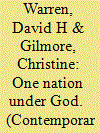

|
|
|
|
|
| Publication |
2014.
|
| Summary/Abstract |
In the wake of the Arab Revolutions of 2011, countries in the Middle East are grappling with how Islamists might be included within a regime of democratic political pluralism and how their aspirations for an "Islamic state" could affect the citizenship status of non-Muslims. While Islamic jurisprudence on this issue has traditionally classified non-Muslims in Islamic society as protected peoples or dhimma, endowed with what the authors term "minority citizenship", this article will examine how the transnational intellectual Wasa?iyya or Centrist movement, of which Sheikh Yusuf al-Qaradawi is the figurehead, have sought to develop a new fiqh of citizenship in which Muslims and non-Muslims have equal civil and political rights. This article will focus on Yusuf al-Qaradawi on the basis that his very recent shift in 2010 on the issue is yet to be studied in depth, as well as in view of the fact that the dilemma faced by reformist Islamic scholars-how to integrate modern concepts into a legal tradition while simultaneously arguing for that tradition's continuing relevance and authority-is for him rendered particularly acute, given that this tradition is itself the very source of his own authority and relevance. It will therefore be argued that the legacy of the Islamic legal tradition structures his discourse in a very specific way, thereby having the potential to render it more persuasive to his audience, and worthy of a more detailed examination.
|
|
|
|
|
|
|
|
|
|
|
|
|
|
|
|
| 19 |
ID:
059635
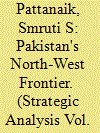

|
|
|
| 20 |
ID:
132311
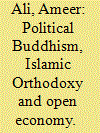

|
|
|
|
|
| Publication |
2014.
|
| Summary/Abstract |
After nearly a millennium of uninterrupted harmony between the Sinhalese and Muslims in Sri Lanka, economic and ethno-religious developments after the 1970s have created an atmosphere of communal tension between the two groups. While a new wave of political Buddhism with its militant offshoot amongst the Sinhalese and the growth of a rigid Islamic orthodoxy amongst the Muslims have provided the ethno-religious dimension to this tension, the post-1977 open economy has added an economic dimension to it. The interplay of this toxic triad is a reminder of a similar scenario that produced the first Sinhalese-Muslim racial riots in the country in 1915. Unlike the first, which occurred in the colonial context, the current one, which if not arrested, will not only jeopardize Sinhalese-Muslim harmony but also will result in adverse consequences in Sri Lanka's relations with Muslim countries.
|
|
|
|
|
|
|
|
|
|
|
|
|
|
|
|
|
|
|
|
|